It’s springtime at Penn, and new deans have been popping up like clovers after a rainstorm.
One’s an anthropologist with a yen for Internet-era ethnography. Another is a global-business expert with a seat on the Council on Foreign Relations. A third is a public-health scholar who founded the National Coalition of Ethnic Minority Nurse Associations. And a fourth is a teacher whose subjects have ranged from basic skills for disadvantaged youth to doctoral-level seminars in curriculum development.
Counting the interim appointment of Wendell Pritchett Gr’97 to lead the Law School, a full five of the University’s 12 schools announced new chief administrators since the Gazette last went to press.
It’s a diverse group. The new slate of leaders includes alumni and fresh faces, seasoned administrators and relative newcomers, faculty from Penn’s present and past, and scholarly backgrounds that have the potential to reset the tones in their respective schools. In no particular order, here’s a little bit about them.
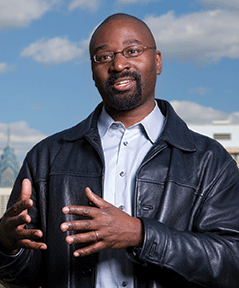
John L. Jackson Jr.
John L. Jackson Jr. came to the University in 2006 as the first Penn Integrates Knowledge (PIK) professor, with primary appointments in the Annenberg School for Communication and the School of Arts and Sciences [“Proof of Concept, Sept|Oct 2008]. On July 1, he will become the dean of the School of Social Policy & Practice (SP2), where he has a secondary appointment.
He will be taking over a school that was thoroughly transformed by Richard Gelles, who in 2001 became dean of what was then called the School of Social Work. Through efforts like the creation of master’s programs in nonprofit leadership, social policy, and clinical social work, Gelles helped to move SP2 more firmly into the realm of public policy. A child-welfare expert with a knack for spearing sacred cows with sharp prose—as in his 2011 book The Third Lie: Why Government Programs Don’t Work and a Blueprint For Change [“Toward a More Perfect Union,” Sept|Oct 2012]—Gelles also remained a productive scholar during his deanship. He will return to the faculty as the Joanne and Raymond Welsh Chair of Child Welfare and Family Violence.
Jackson, the Richard Perry University Professor of Communication, Africana Studies and Anthropology, brings a unique skill set to the post. He is an ethnographer, an eloquent defender of qualitative research in the age of Big Data triumphalism, and a probing writer about class stratification, social networks, and race relations in the post-civil-rights era.His latest book, Thin Description: Ethnography and the African Hebrew Israelites of Jerusalem, focuses on a utopian community of African Americans living near the Dead Sea [“John Jackson, Ethnography, and the Hebrew Israelites,” Mar|Apr].
“John is a distinguished teacher, a renowned scholar, and a visionary leader whose work crosses traditional academic boundaries and involves community partners in understanding and confronting societal challenges,” said Penn President Amy Gutmann in a statement. “He is the best person to advance the School of Social Policy & Practice toward its goal of becoming the leading center for interdisciplinary teaching and research on social innovation, impact, and justice.”
“I am so incredibly excited about this opportunity,” Jackson said in a statement, “and I look forward to working with the faculty, students, staff and alumni of this impressive and inspiring school as they continue to demonstrate the value of putting cutting-edge scholarship, research, and theory in service to the public good.”
Wharton has also been hunting for a dean since Thomas Robertson announced last April that he would return to teaching marketing at the conclusion of his seven-year term in June. Robertson emphasized innovation, global initiatives, and social impact during a tenure marked by stiff challenges to the enterprise of business education in America. Robertson took office shortly before the collapse of Bear Stearns and Lehman Brothers reset the landscape of the financial-services industry, which had become the destination for nearly half of Wharton’s MBA grads in the preceding years. He responded ably—an impressive 97.8 percent of last year’s MBA crop received full-time offers within three months of graduation—but anxieties remain. In October The Wall Street Journal reported a 12 percent decline in applications to Wharton’s MBA program, even as its competitors have rebounded from financial-crisis dips.
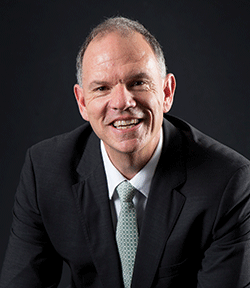
Geoffrey Garrett
The school’s choice for a new leader, political economist Geoffrey Garrett, was deemed a “surprise” by The Wall Street Journal—and by Garrett himself, who has worn many hats since teaching multinational management at Wharton for two years in the mid 1990s.
The Oxford- and Duke-trained political scientist taught that subject at Yale, where he also directed the Program in Ethics, Politics and Economics. After stints at UCLA and the University of Southern California, Garrett spent seven years directing the Pacific Council on International Policy, a “non-partisan organization” of “globally-oriented business, civic, and government leaders.” More recently, he has been dean of two business schools in his native Australia, serving for one year each at the University of Sydney’s business school and at the University of New South Wales’ Australian School of Business.
At the latter, said Penn Provost Vincent Price in a statement, “he helped oversee the creation of a university-wide innovation center, bringing together faculty and students from business, design, engineering and science. His approach to scholarship and discovery fits perfectly with Penn’s commitment to integrating knowledge across disciplines.”
Garrett arrives at Wharton amid growing speculation about the potential popping of an American “MBA bubble.” Business degree programs have proliferated in the past 20 years, and Internet-based education options have exploded in the last two or three. Publications including The Wall Street Journal and Businessweek have reported that MBA hiring and pay have flagged as record numbers of new grads have flooded an increasingly competitive marketplace.
“The reason I was an attractive candidate,” Garrett suggested to The Australian newspaper in March, “is that Australian business schools are feeling certain pressures a little sooner here than elsewhere—things such as integrating technology in the classroom.” He will begin facing those pressures at Wharton on July 1.
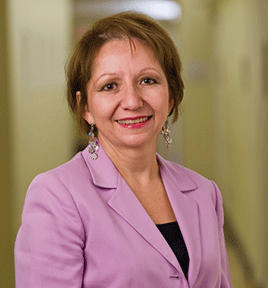
Antonia Villarruel
On the same day, the School of Nursing will bid farewell to Afaf Meleis [“The Energizer Dean,” Jan|Feb 2009], whose 12-year deanship coincided with a tripling of the school’s endowment, the expansion of its student body by about 50 percent, and the renovation of Claire Fagin Hall. Meleis will be succeeded by Antonia Villarruel GNu’82, who was a faculty member at the school between 1995 and 2000.
Villarruel will be returning to Penn from the University of Michigan School of Nursing, where she is a professor and associate dean for research and global affairs, with a joint appointment at Michigan’s School of Public Health.
Her scholarship, which has been supported by the NIH and the CDC, focuses on developing health-promotion interventions for Latino, Mexican, and Puerto Rican populations. She has served on the Secretary’s Advisory Council for Minority Health and Health Disparities for the US Department of Health and Human Services, and was a founder and past president of the National Coalition of Ethnic Minority Nurse Associations.
“I am thrilled and honored to be back,” Villarruel said in a statement, “and to have the opportunity to lead the next chapter of the amazing legacy of Penn Nursing. The ‘Penn Compact 2020’ is aligned with what nursing does best—creating access, integrating knowledge, and making an impact locally and globally—and serves as a strong platform in which nursing can lead.”
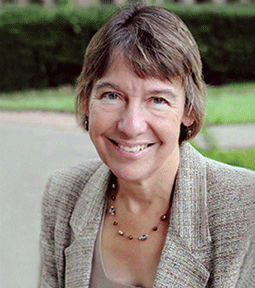
Pam Grossman
On January 15, the leadership reins at the Graduate School of Education will pass from Andrew Porter to Pam Grossman.
Porter, an applied statistician and psychometrician, retires from the post after a seven-year tenure marked by an expansion of GSE’s academic programs and an embrace of non-traditional collaborations, from the Med Ed executive master’s program it jointly launched with the Perelman School of Medicine in 2012, to a master’s program targeting senior-level executives in charge of corporate-based training [“(Fund/Copy/Steal/Sell) This Education,” Jan|Feb 2011].
Grossman is a classroom veteran with a longtime focus on the educational needs of children who live in challenging circumstances. She began her career teaching basic skills to low-income youth at the CETA Youth Program Skills Center in New Haven, Connecticut. During a six-year stint as an English teacher at a private college-preparatory school in San Francisco, she also worked in the University of Alaska’s Upward Bound program for first-generation college students, and as a career and education counselor with Adult Learning Programs of Alaska. Following 12 years as a professor of curriculum and instruction at the University of Washington, Grossman became a professor at Stanford’s Graduate School of Education in 2000. She is currently faculty director of Stanford’s Center to Support Excellence in Teaching, which focuses on supporting the work of early-career teachers.
“Pam’s professional career brilliantly blends service as both a K-12 teacher and a scholar at the university level, giving her particular insight into how schools of education can respond to the needs of diverse populations of educators,” said Gutmann in a statement.
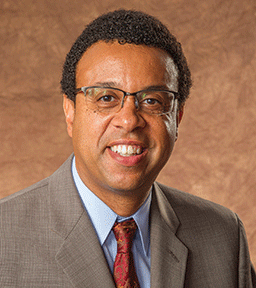
Wendell Pritchett
Finally, the February announcement of Tulane University’s selection of Penn Law Dean Michael Fitts as its new president has put the Law School in the market for a new chief administrator. During 14 years at the helm, Fitts grew Penn Law’s faculty by 40 percent, quadrupled the number of cross-disciplinary and joint-degree programs at the school, and oversaw a physical transformation of its campus, capped by the 2012 completion of Golkin Hall [“Gazetteer,” May|June 2012]. While the search for a replacement gets under way, Wendell Pritchett will serve as interim dean for the 2014-15 academic year. Pritchett is returning to Penn from Rutgers University-Camden, where he served as the first African-American chancellor. An urban historian and member of Philadelphia’s School Reform Commission [“Doomsday in the District,” Mar|Apr 2014], Pritchett had indicated in February that he would be returning to teach at Penn Law, where he was a faculty member from 2001 to 2009, and associate dean for academic affairs from 2006-7. His appointment as interim dean was announced in April.
“Wendell’s extensive experience as an academic leader and administrator, his expertise in urban policy and education, and his familiarity with the realities and dynamics of government make him the ideal interim leader of Penn Law,” Price said in a statement. “His leadership will benefit both Penn Law and the entire University.”—T.P.

